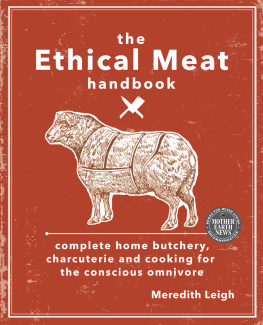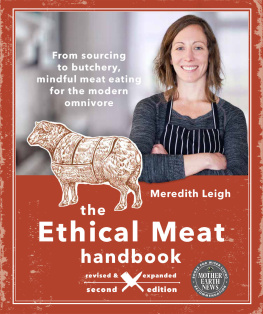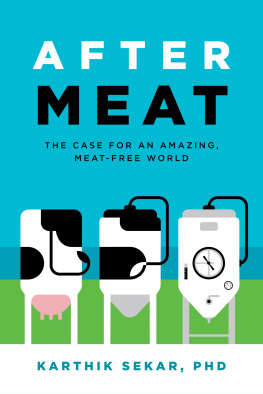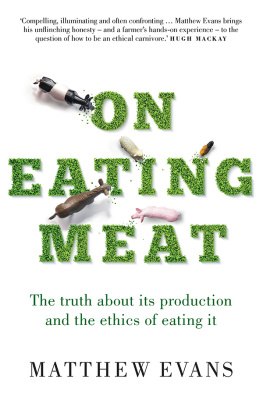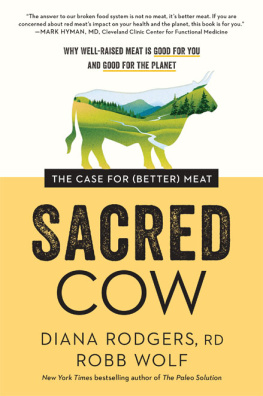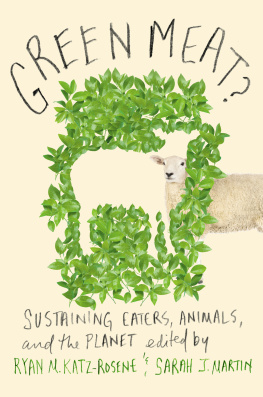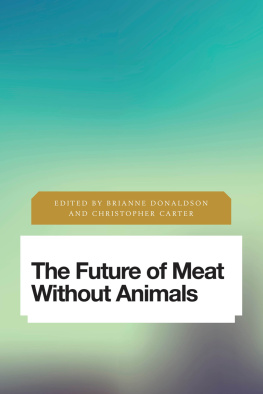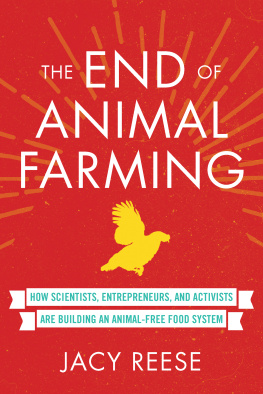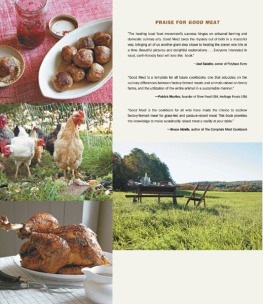Praise for The Ethical Meat Handbook
This book is practical, yes, but its also deeply personal. Meredith Leigh will teach you how to raise animals, butcher them, and cook and cure their meat. Even better, she explains what it means and why it matters, and her passion is infectious. After reading this book, I longed to smell the deep funk of the barn, to feel the squish of mud beneath my chore boots, to heft a butcher knife in my hand.
Mark Essig, author of Lesser Beasts: A Snout-to-Tail History of the Humble Pig
This is a powerful, positive book about a powerful, positive alternative, engaging us in shaping a new food and agriculture narrative. It leaves us with an overwhelmingly clear picture of just how important ethical meat is to the future of the entire food system. It is exactly what our movement needs, a call for people to take action, educate themselves, and participate. This book is a gem, a gift to everyone looking to be the alternative to a passive recipient of the status quo. This book its philosophy, honesty, artistry, and practice, represents a way forward the only way to go.
Jean-Martin Fortier, from the Foreword
With a warm, welcoming tone, Meredith Leigh invites readers to the table to learn everything there is to know about raising, slaughtering, butchering, and preparing good meat. This is the most comprehensive guide that I have ever seen on the subject. Im looking forward to trying some of the delicious looking Southern-inspired recipes in the book too. Ms. Leigh has obviously put a great deal of work into this book and it shows.
Rebecca Thistlethwaite, Farm & Sustainability Consultant and author,
Farms with a Future: Creating and Growing a Sustainable Farm Business, and
The New Livestock Farmer: The Business of Raising and Selling Ethical Meat
Copyright 2015 by Meredith Leigh. All rights reserved.
Cover design by Diane McIntosh. Cover illustration by Rob Hunt.
Printed in Canada. First printing August 2015.
New Society Publishers acknowledges the financial support of the Government of Canada through the Canada Book Fund (CBF) for our publishing activities.
This book is intended to be educational and informative. The author and publisher disclaim all responsibility for any liability, loss or risk that may be associated with the application of any of the contents of this book.
Inquiries regarding requests to reprint all or part of The Ethical Meat Handbook should be addressed to New Society Publishers at the address below. To order directly from the publishers, please call toll-free (North America) 1-800-567-6772, or order online at www.newsociety.com
Any other inquiries can be directed by mail to:
New Society Publishers
P.O. Box 189, Gabriola Island, BC V0R 1X0, Canada
(250) 247-9737
LIBRARY AND ARCHIVES CANADA CATALOGUING IN PUBLICATION
Leigh, Meredith, 1983, author
The ethical meat handbook : complete home butchery, charcuterie and cooking for the conscious omnivore / Meredith Leigh.
Includes index.
Issued in print and electronic formats.
ISBN 978-0-86571-792-3 (paperback). ISBN 978-1-55092-603-3 (ebook)
1. Cooking (Meat). 2. Meat Moral and ethical aspects. 3. Meat industry and trade Moral and ethical aspects. 4. Slaughtering and slaughter-houses Moral and ethical aspects. 5. Cookbooks. I. Title.
TX749.L44 2015 | 641.6'6 | C2015-905547-4
C2015-905548-2 |
New Society Publishers mission is to publish books that contribute in fundamental ways to building an ecologically sustainable and just society, and to do so with the least possible impact on the environment, in a manner that models this vision. We are committed to doing this not just through education, but through action. The interior pages of our bound books are printed on Forest Stewardship Council-registered acid-free paper that is 100% post-consumer recycled (100% old growth forest-free), processed chlorine-free, and printed with vegetable-based, low-VOC inks, with covers produced using FSC-registered stock. New Society also works to reduce its carbon footprint, and purchases carbon offsets based on an annual audit to ensure a carbon neutral footprint. For further information, or to browse our full list of books and purchase securely, visit our website at: www.newsociety.com.
Contents
Foreword
by Jean-Martin Fortier
A long time ago I read a book called The New Organic Grower, which opened my mind to the importance and practice of small-scale vegetable production. Eliot Colemans famed book not only gave instructions about how to do things, it provided an ethos about good food and the way forward. This book changed my life and shaped the path Ive been following ever since. Books such as his are just as rare as they are important, because they can transform ideas of sustainable living into practical and proactive practices. I believe The Ethical Meat Handbook is one of these books.
As a vegetable grower, my focus has always been on the plant side of things. My farm is nothing more than a big garden, and if you read some of my work, Ive often advocated that young growers NOT include animals in the system, arguing that animal husbandry could enslave you to your farm and require a lot of initial investment.
Lately, Ive been changing my mind about that, mostly as Ive learned more about the management of perennial systems, based on pastured land where herds of animals are moved very frequently. These are the low-tech, high-management systems that my friend Joel Salatin has been teaching us about for nearly 30 years, systems that dont require land to be tilled, or for much grain to be fed to livestock.
As I have learned more about polycultures and the overall importance of animals in a restorative farming model, I have had a joyful change of heart.
The fact that every good farmer is aware of, regardless of his conscious practice, is that animals and plants managed together, holistically, provide powerful ecosystem benefits via natural trophic exchange. Plants are the only beings that can turn solar energy into usable energy for all life, but they depend on high energy being returned to the soil. As such, animals offer a simple, closed-circle fertility input that is beneficial to our farmland. When managed properly, and holistically, animals and plants together provide sustainable solutions.
As I have begun to learn about holistic animal agriculture, and work to merge it with my current farming consciousness, one issue has remained to nag at me: what about the slaughtering and butchering of the livestock? Where is the system or thinking for post-production that feels right, and ready? And it is here, at the intersection of the right production points, and this nagging question, that The Ethical Meat Handbook soars. It brings to light not only an ethos about meat consumption that I believe we should all agree on (both meat eaters and vegetarians alike), but most importantly, it also provides guidelines about how to conduct ourselves responsibly in relationship to the earth.
By drawing on hard-earned experience and profound insight, author Meredith Leigh challenges us to consider ethical meat production as center stage in our food conundrums; or at the very least, recognize the threads in our fraught and flawed meat industry that are patterned through our entire food system. Further, she challenges us to see that a proliferation of small-scale butchers working in relationship with local farmers will play an important role in the rebuilding of our food systems. The evidence of this is clear: People strongly opposed, saddened and angry at the way our society treats its animals in factory farms are looking for alternatives, and they can find it in ethical meat, locally raised and butchered. The demand for locally grown products is driving a new cohort of young people back into the business of small-scale agriculture, and this demand will only move forward as we increase our understanding of the ecological, economic, and social importance of ethical meat.
Next page
